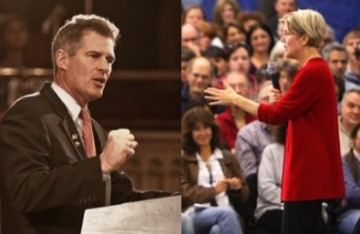Third Brown-Warren Debate: Who Came Out On Top?
Thursday, October 11, 2012

The first topic the two candidates addressed was the still struggling economy in the Commonwealth.
Warren took Brown to task for voting against three jobs bills in a row, while nearly 200,000 residents are currently unemployed in the Bay State.
"That's how we jumpstart the economy," she said. "We've got work that needs to be done and we put people back to work."
She also noted that Thursday will be the first anniversary of the Republican Senator's vote against one of the sorely needed jobs bills.
Brown defended his voting record, saying that Thursday is also the anniversary of his protecting taxpayers' wallets and that the bills were rejected by Senators on both sides of the aisle.
"You have to read the bill, you have to see how it affects everybody else," said Brown, adding that he did go on to support a bipartisan jobs bill.
"The best answer is to come and put the money in the communities."
Debating Obamacare
On the topic of healthcare, Brown said that while he supported the Massachusetts healthcare law as a State Senator and believed everyone should have coverage, President Barack Obama's Affordable Care Act (ACA) would take money out of Medicare at the same time that it levied 18 additional new taxes.
"This is a jobs-crushing bill that is going to crush Massachusetts businesses."
Warren cited a statement from the American Association of Retired Persons that said the ACA would actually strengthen Medicare by eliminating waste and fraud without reducing benefits to seniors.
"This is going to be a big driver for the economy here in Massachusetts," she said of the President's bill, "and ultimately for saving healthcare around the country."

Two Visions

Brown used a question on the rising cost of higher education to take a shot at his opponent, blaming administrative costs for being a driving force behind the increases and pointing to Warren's $350,000 salary from Harvard for teaching just one class.
For her part, Warren said she was able to attend a commuter college for just $50 per semester because the country was investing in public higher education and would benefit from doing more of the same now.
The incumbent Senator reiterated his support for a balanced budget amendment and stood by his decision to sign the Grover Norquist pledge not to raise taxes.
"I've never voted for a tax increase and I'm not going to be raising taxes on any American," he said.
"I'm glad Grover Norquist agrees with me. We shouldn't be raising taxes on anyone in the middle of a three-and-a-half year recession."
Meanwhile, Warren argued for a balanced approach of spending cuts and increased revenues to reduce the federal debt.
"It takes both to close the deficit," she said.
"We have got to find the right balance in the system. We've got to go to a sensible place."
Both candidates reiterated their pro-choice beliefs and their stances on women's issues, with Brown defending his votes against an equal pay for equal work bill and a bill that would require employers to provide contraception coverage to employees because of shortcomings in the bills themselves even though he agreed with the ideas.
"These votes matter," countered Warren. "Roe vs. Wade may hang in the balance."
In his final appeal to voters, Brown stressed the importance of reaching across the aisle.
"This is a critical election for Massachusetts," he said. "Right now we need to work together in a truly bipartisan manner."
Warren ended by painting a picture of Republican politicians who want to cut taxes for those at the top and let the rest of the country pick up the pieces.
"I belive we can do better than that, she said. "And we must do better than that."

Warren Benefits From Format

With no big surprises surfacing in the third debate, both candidates were able to focus on getting their messages across to voters, said Michael Walsh, a Political Science professor at Westfield State University.
"I think they both achieved what they were looking to do."
While Brown hit on Warren's legal work for LTV Steel and Travelers Insurance, it was only briefly, and the question of her Native American heritage, which took up a substantial portion of time during the first two debates, went unmentioned in the hour-long meeting.
"I think that he may have been a little bit stiff at times where he was not quite as aggressive as we was in the past," said Walsh of Brown's performance.
"It's hard to project yourself as the nice guy and still go on the attack."
Robert Boatright, an associate professor of Political Science at Clark University, said Wednesday's debate was the best so far for being more substantive than the previous two.
"I thought it was a good night for Warren in that the format kept things on policy and away from the character attacks," he said.
"Brown did a little less well. He looked awkward -- saying 'obviously' virtually every other sentence."
Boatright said the effect of the presidential debate was clearly evident, with Brown reusing lines that worked for Republican candidate Mitt Romney without mentioning him and Warren quick to call him out on it.
But by the third meeting, said Boatright, the importance of the debates has already begun to fade.
"There were no obvious gaffes and the candidates largely stayed true to their approaches form the first two. Probably fewer people watched this one," he said.
"At this point what matters is the ground game and, possibly, how much enthusiasm there is in Massachusetts for Obama and Romney."
As for the final days of the race, Walsh said to expect three more weeks of what voters saw in Springfield Wednesday night.
Related Articles
- Third Senate Debate: Can Warren Stay On The Offensive?
- Second Brown-Warren Debate: Who Came Out On Top?
- Second Senate Debate: Can Brown Seize Momentum?
- First Brown-Warren Debate: Who Came Out On Top?
- What to Expect From the Brown-Warren Debate
- NEW: Warren Calls Brown Out on Voting Record




Follow us on Pinterest Google + Facebook Twitter See It Read It